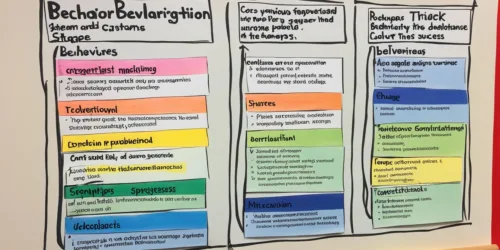Unlocking the Power of Emotionality: We Explore Its Impact
Welcome to our exploration of the power of emotionality and its profound impact on our lives. As humans, emotions are an integral part of our existence, influencing our thoughts, behaviors, and relationships. In this article, we delve into the realms of emotional intelligence, empathy, and compassion, uncovering the transformative potential they hold.
Key Takeaways
- Emotionality plays a significant role in our overall well-being and can affect our immune and nervous systems.
- Expressing emotions and being vulnerable is vital for building connections and trust, especially for leaders, coaches, and creatives.
- Emotional intelligence involves recognizing, understanding, and managing emotions effectively, leading to stronger interpersonal skills and meaningful relationships.
- Empathy allows us to step into others’ shoes, fostering understanding, connection, and compassion.
- Compassion, the outcome of empathy, drives acts of kindness, support, and care, enhancing the well-being of individuals and society as a whole.
Understanding Emotional Intelligence: Recognize, Understand, and Manage Emotions
Emotional intelligence is a vital skill that plays a significant role in our personal and professional lives. It encompasses various key elements such as self-awareness, self-regulation, empathy, social skills, and motivation. By developing emotional intelligence, we can enhance our ability to recognize, understand, and manage emotions effectively.
Self-awareness is the foundation of emotional intelligence. It involves being in tune with our own emotions, thoughts, and behaviors. By becoming more self-aware, we can gain a better understanding of how our emotions influence our thoughts and actions. This awareness allows us to make conscious choices and regulate our emotions in a way that aligns with our values and goals.
The next aspect of emotional intelligence is empathy. Empathy enables us to understand and connect with the emotions and experiences of others. It involves putting ourselves in someone else’s shoes and viewing the world from their perspective. By practicing empathy, we can build stronger relationships, navigate conflicts more effectively, and foster a sense of understanding and compassion.
The Benefits of Emotional Intelligence
“Emotional intelligence is not just a ‘nice-to-have’ skill; it is a crucial tool for personal growth and success in all areas of life. When we possess emotional intelligence, we can navigate challenging situations with greater ease, communicate effectively with others, and build deeper, more meaningful connections. It also enables us to manage stress and adapt to change, ensuring our overall well-being and success.”
In addition to self-awareness and empathy, emotional intelligence also encompasses social skills and motivation. Social skills refer to our ability to communicate and interact effectively with others. It involves active listening, assertiveness, and the ability to resolve conflicts in a constructive manner. Motivation, on the other hand, drives us to set and achieve goals, persevere in the face of challenges, and maintain a positive attitude.
By understanding and developing emotional intelligence, we can harness the power of our emotions to lead more fulfilling lives. It allows us to build stronger connections, communicate effectively, and navigate the complexities of our emotions and relationships. Embracing emotional intelligence empowers us to recognize, understand, and manage our emotions and those of others, leading to personal growth and success.
| Benefits of Emotional Intelligence | Key Elements |
|---|---|
| Enhanced self-awareness | Self-awareness |
| Improved social skills | Social skills |
| Stronger empathy and understanding | Empathy |
| Effective emotion regulation | Self-regulation |
| Goal-oriented motivation | Motivation |
The Power of Empathy: Stepping Into Others’ Shoes
Empathy is a remarkable ability that allows us to understand and connect with others on a deeper level. It goes beyond sympathy, which is merely feeling sorry for someone, and instead, requires us to step into their shoes and experience their emotions firsthand. By cultivating empathy, we foster a sense of understanding, connection, and compassion in our interactions with others.
When we practice empathy, we acknowledge and validate the feelings of those around us. We choose to listen actively, without judgment, and strive to comprehend their experiences from their perspective. This genuine effort to understand and relate to others creates a strong foundation for building meaningful relationships and fostering a sense of unity.
Empathy has the power to break down barriers and bridge divides. It helps us recognize our shared humanity and reminds us that we are all interconnected. By embracing empathy, we can create a society where understanding and compassion prevail, paving the way for a more harmonious and inclusive world.
Empathy is about finding echoes of another person in yourself.” – Mohsin Hamid
The Importance of Empathy in the Workplace
Empathy is not only essential in personal relationships but also in the professional world. In the workplace, it enables effective collaboration, teamwork, and leadership. When leaders and managers demonstrate empathy, they create an environment where employees feel valued and understood. This leads to increased job satisfaction, higher employee engagement, and improved overall performance.
Furthermore, empathy in the workplace fosters better communication and conflict resolution. By understanding the emotions and perspectives of their colleagues, individuals can navigate disagreements with empathy and find mutually beneficial solutions. Empathy also enhances customer relationships, as employees who empathize with customers can provide better support and address their needs more effectively.

| Benefits of Empathy in the Workplace | Examples |
|---|---|
| Improved teamwork: Empathy encourages collaboration and cooperation among team members. | Leaders facilitate open and honest communication, allowing team members to express their concerns and ideas freely. |
| Enhanced leadership: Empathetic leaders inspire and motivate their team, creating a positive work environment. | A manager understands the challenges faced by their employees and provides support and guidance to help them succeed. |
| Increased customer satisfaction: Empathetic employees connect with customers, addressing their needs and concerns. | A customer service representative listens attentively and empathetically to a frustrated customer, resolving their issue with care and understanding. |
By recognizing the power of empathy and cultivating it in our personal lives and workplaces, we can create a more compassionate and understanding world. Embracing empathy allows us to connect with others on a profound level, fostering stronger relationships, resolving conflicts empathetically, and building a more inclusive society where everyone feels seen, heard, and valued.
Cultivating Compassion: The Outcome of Empathy
Compassion is the natural result of fostering empathy and understanding. When we put ourselves in others’ shoes and truly empathize with their experiences and emotions, we develop a deep sense of compassion towards them. Compassion drives us to act with kindness, support, and care, creating a positive impact on the lives of those around us. As we cultivate our emotional intelligence and expand our capacity for empathy, our ability to demonstrate compassion grows, fostering a more compassionate and understanding world.
Compassion is not just a fleeting sentiment; it is an active force that prompts us to extend a helping hand, provide emotional support, and show genuine care for others. It is through compassion that we offer a sense of belonging and understanding to those who may be struggling or in need. With compassion, we can uplift others, provide solace during challenging times, and foster a sense of unity within our communities.
When we approach our interactions with compassion, we create an environment that values empathy, kindness, and understanding. Compassion enables us to listen attentively to others, validating their experiences and emotions without judgment. It allows us to offer support and provide a safe space where individuals can express themselves freely. By cultivating compassion, we strengthen our relationships, enhance our communication skills, and build a foundation of trust and empathy.
| Benefits of Cultivating Compassion | Examples |
|---|---|
| Improved well-being | Reduced stress levels and increased happiness |
| Positive impact on relationships | Deeper connections and increased emotional intimacy |
| Enhanced self-esteem | Feeling good about oneself by helping others |
| Greater resilience | Ability to bounce back from challenges with compassion and understanding |
As we continue to cultivate compassion within ourselves and promote its practice in our communities, we contribute to a more empathetic and caring society. Each act of compassion, no matter how small, has the power to make a significant difference in someone’s life. Let us embrace the outcome of empathy and nurture compassion in ourselves and others, fostering a world where kindness, support, and care are deeply valued and widely practiced.
Enhancing Connections and Communication through Emotional Intelligence
Emotional intelligence is the key to fostering deeper connections, enabling authentic interactions, and promoting effective communication. By cultivating self-awareness, empathy, and active listening, we can nurture genuine relationships that go beyond surface-level interactions.
When we develop emotional intelligence, we become more attuned to our own emotions and those of others. This heightened awareness allows us to understand different perspectives and respond empathetically, leading to more meaningful connections. By actively listening to others, we demonstrate respect and create space for open and honest communication.
Embracing emotional intelligence also equips us with the skills to navigate conflicts empathetically. Instead of engaging in confrontations that could strain relationships, we can approach disagreements with understanding and a willingness to find mutually beneficial solutions. This preserves connections and strengthens the bonds we share with others.
Ultimately, the power of emotional intelligence lies in its ability to create authentic interactions. By fostering self-awareness, empathy, and effective communication, we enhance our interpersonal skills and build connections that are rooted in trust, respect, and understanding. Let us embrace emotional intelligence to forge deeper connections and foster a world of authentic interactions.
FAQ
How does emotional shutdown affect our overall well-being?
Emotional shutdown can have a negative impact on our immune and nervous systems, leading to decreased well-being.
Why is expressing emotions important for leaders, coaches, and creatives?
Expressing emotions and being vulnerable is important for building connections and trust, which is crucial for leaders, coaches, and creatives in their respective fields.
What role does emotional intelligence play in building relationships?
Emotional intelligence plays a crucial role in our ability to connect with others on a deeper level, empathize, and develop strong interpersonal skills.
How does empathy enhance our connections with others?
Empathy allows us to understand and share the feelings of others, fostering deeper connections and a sense of compassion.
How does cultivating compassion impact those around us?
Nurturing compassion drives acts of kindness, support, and genuine care for others, positively impacting those around us.
How does emotional intelligence enhance communication skills?
Emotional intelligence enhances our communication skills by allowing us to express ourselves effectively while also understanding and respecting the perspectives of others.
Emotional intelligence helps navigate conflicts empathetically, preserving relationships and fostering deeper connections.
What are the benefits of embracing emotional intelligence?
Embracing emotional intelligence can lead to more meaningful and authentic interactions, enhancing connections with others.






